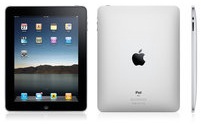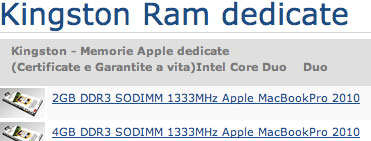Mac OS X 10.6.3 Remains in Developer Testing
Apple released another build of Mac OS X 10.6.3 to registered developers. Build 10D567 is reportedly similar to previous builds and follows just six days after the last release.
Mac OX 10.6.3 build 10D567 weighs in at 718.7MB as a delta download, 783.3MB as a combo update.
Attached notes below. Mac OS X 10.6.3 continues to contain no known issues. Developers are asked to focus their attention on Graphics Drivers, iChat, QuickTime, Printing and Rosetta.
The 10.6.3 Update is recommended for all users running Mac OS X Snow Leopard and includes general operating system fixes that enhance the stability, compatibility, and security of your Mac, including fixes that:
- improve the reliability and compatibility of QuickTime X
- address compatibility issues with OpenGL-based applications
- address an issue that causes background message colors to display incorrectly in Mail
- resolve an issue that prevented files with the # or & characters in their names from opening in Rosetta applications
- resolve an issue that prevented files from copying to Windows file servers
- improve performance of Logic Pro 9 and Main Stage 2 when running in 64-bit mode
- improve sleep and wake reliability when using Bonjour wake on demand
- address a color issue in iMovie with HD content
- improve printing reliability
- resolve issues with recurring events in iCal when connected to an Exchange server
- improve the reliability of 3rd party USB input devices
- fix glowing, stuck, or dark pixels when viewing video from the iMac (Late 2009) built-in iSight camera
iPad Available in US on April 3

Apple has announced today that the iPad will ship in the US on April 3 with WiFi+3G models following in late April. Apple also said that all models of iPad would be available in Australia, Canada, France, Germany, Italy, Japan, Spain, Switzerland and the UK in late April.
US customers can begin pre-order both WiFi and WiFi+3G iPad models starting March 12 or reserve a Wi-Fi model to pick up on Saturday, April 3, at an Apple retail store.
“iPad is something completely new,” said Steve Jobs, Apple’s CEO. “We’re excited for customers to get their hands on this magical and revolutionary product and connect with their apps and content in a more intimate, intuitive and fun way than ever before.”
Apple pushes out another beta of Mac OS X 10.6.3 clear of issues
Apple on Wednesday evening extended to its developer community yet another beta of Mac OS X 10.6.3 which lists no known issues, suggesting a formal release over Software Update may be around the corner.
The pre-release software, labeled Mac OS X 10.6.3 build 10D561, arrives exactly two weeks after the Mac maker equipped developers with build 10D552, which similarly listed no known issues.
People familiar with the latest beta claim no changes have been made to the software’s enhancements checklist, which includes an update to QuickTime X that improves security and compatibility while simultaneously enhancing overall reliability.
Other changes present since earlier betas include tweaks that enhance the performance of Apple’s 64-bit Logic pro audio suite and improved compatibility with third-party printers and OpenGL-grounded applications.
Those familiar with Wednesday’s beta say Apple is now asking developers to focus their evaluation efforts on Bluetooth, iChat, and USB, in addition to two previously listed focus areas: graphics drivers and QuickTime.
An earlier emphasis on AirPort testing has reportedly been omitted from build 10D561.
Mac OS X 10.6.3 currently weighs in at just over 716MB in Delta form, down slightly from the 737MB package distributed with the previous seeding.
iTunes Celebrates 10 Billion Song Downloads
Since the iTunes Store opened in April 2003 Apple has led a major change to the music industry and today celebrated the sale of the 10 billionth song from the online store. Apple celebrated the sale of 1 billion songs in February 2006 and 3 billion in July of 2007. The person who downloaded the 10 billionth song will win a $10,000 iTunes gift card. The 10 billionth song download coincides with Apple CEO Steve Jobs’ 55th birthday.

RAM Modules Destined for 2010 MacBook Pro Spotted
Despite the expectation that new MacBook Pro models were going to arrive towards the start of the month Apple has yet to release the rumoured machines. Today more evidence of the new MacBook Pros has been discovered.
ThesMac.gr has published a screenshot of memory modules listed for use in a “MacBook Pro 2010″. The listing unfortunately contains numerous errors, listing the RAM type as DDR3 running at 1333MHz, which would not be compatible with the expected processors.
On the other hand the part numbers are inline with expectations and the part has begun working its way to other retailers.
The discovery raises the probability of a MacBook Pro refresh in the near future.

Inside Apple’s iPad: Adobe Flash
Apple’s new iPad is being criticized for lacking the capacity to render interactive content built using Adobe’s Flash platform, but the company shows no sign of reversing course.
Jobs Shunned Flash During WSJ Meeting
Rumours suggest that when Apple CEO Steve Jobs met with Wall Street Journal editors to show off the iPad the subject quickly turned to Adobe Flash and the lack of compatibility.
The details published by Valleywag say that during the meeting Jobs defended Apple’s decisions by calling Flash “a CPU hog” and is full of “security holes” adding that Apple doesn’t “spend a lot of energy on old technology.”
Jobs who has a history of abandoning technologies is also rumoured to have said that playing videos in Flash would reduce the iPads battery from 10 hours to 1.5 hours recommending that the WSJ abandon Flash in a “trivial” move and adopt H.264.
Apple plans dual graphics enhancements on future MacBook Pros
One of the advances Apple plans for future MacBook Pro models is an improvement to the handling of the notebooks’ dual graphics chips. More specifically, the Mac maker has up and running in its labs several next-generation MacBook Pros that can switch between their integrated and discrete graphics processors automatically, according to people familiar with the matter.
Nokia and Intel launch new mobile operating system
Nokia and Intel will merge two of their mobile operating systems into Meego, a Linux-based, open operating system for everything from advanced smartphones to netbooks, connected TVs and tablet computers, the companies said at a joint press conference on Monday.
The new operating system will combine the best features from each operating system, including the Moblin core and the UI (user interface) toolkit from Maemo. Intel developed Moblin, and Nokia developed Maemo. The first version of MeeGo will ship during the second quarter.
The first devices based on the operating system are expected to arrive during the second half of 2010, according to Renée James, senior vice president and general manager at Intel’s Software and Services Group.
The operating system will support both Intel’s Atom and ARM architectures. The MeeGo source code, along with the build system and developer tools will be released in the coming weeks, according to a FAQ on the MeeGo website.
The MeeGo code will be hosted by the Linux Foundation, and anyone who wants to develop an application for MeeGo will use the Qt framework. The use of Qt will let users develop an application once and then run it on multiple platforms, according to Kai Öistämö, executive vice president for devices at Nokia.
So far, Nokia is the only company that has said it will ship phones with MeeGo. However, more hardware partners and operators will announce support and product plans for MeeGo in the coming weeks, James said.
The arrival of MeeGo will not change Nokia’s plans for Symbian. That operating system will still be used on cheaper smartphones, according to Öistämö.
IBM plans Lotus for Apple iPad, e-reader eye strain explored
IBM just released its Lotus software for the iPhone and has now turned its attention to the iPad, while a new article explores the facts and myths of LCD eye strain from reading books on devices like the iPad.
Amazon may compete with Apple iPad by giving away free Kindles
As Amazon’s e-book business continues to evolve in the wake of the Apple iPad announcement, a new rumor suggests the company is exploring the possibility of giving a Kindle reader to its best customers.
Michael Arrington of TechCrunch reported Friday that Amazon is considering a promotion that would give a free Kindle to subscribers of its Amazon Prime service. At a cost of $79 per year, Prime offers free two-day shipping on selected items, and one-day shipping for just $3.99.
"These are Amazon’s very best customers -- the ones who tend to make multiple purchases per month," Arrington wrote. "And they are also likely to buy multiple books per month on their Kindle devices. If those users buy enough books, and Amazon gets the production costs of the Kindle down enough, Amazon can get Kindles into “millions” of people’s hands without losing their shirt."
Citing a "reliable source," he said Amazon’s goal is to find a way to put a Kindle in the hands of Prime subscribers without losing money on the deal. The company ran a promotion in January where they asked users to try the Kindle, and those who were not satisfied were given a full refund, but got to keep the hardware.
The moves are just another example of Amazon rethinking its Kindle platform following Apple’s iPad announcement. The company recently purchased touch-screen maker Touchco, which it plans to incorporate into the Kindle’s hardware division for a future version of the device.
Amazon has said it has sold millions of Kindles, but has not given an exact number. Still, the e-book market has proved to be of value to the online retailer: The company revealed last month that it sells six Kindle e-books for every 10 physical books.
The Kindle and large-screen Kindle DX are available in over 100 countries, and the Kindle iPhone application is available in Apple’s App Store in over 60 countries. E-books can be synced between the Kindle reader, PC software, and Apple’s iPhone and iPod touch. Kindle software is also forthcoming for the Mac and iPad.
But Apple hopes to counter Amazon with its recently announced iPad. At the product’s unveiling, Apple co-founder Steve Jobs credited Amazon with pioneering the e-book market with the Kindle, but he said Apple intends to improve on that model. "We’re going to stand on their shoulders and go a bit further," he said.
With a 9.7-inch screen and a starting price of $499, the iPad offers a vibrant, color screen suited for a variety of multimedia consumption, while Amazon’s e-ink, black-and-white Kindle is best suited for reading books.
Apple will serve books for the iPad through its iBookstore, due to be a part of the iBooks application for iPad. The software features a 3D virtual bookshelf displaying a user’s personal collection, and allows the purchase of new content from major publishers. Like the Kindle, it will offer content from the New York Times Bestsellers list.
The introduction of the iPad has driven publishers to force Amazon into higher prices for new hardcover bestsellers. While books are currently priced at $9.99 on the Kindle, that is expected to rise to between $12.99 and $14.99 by the time the iPad launches in March.